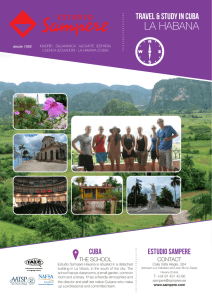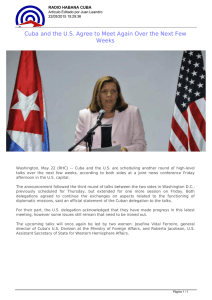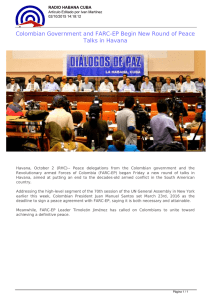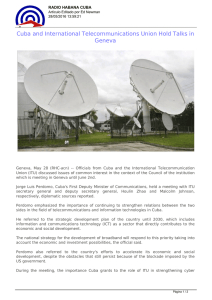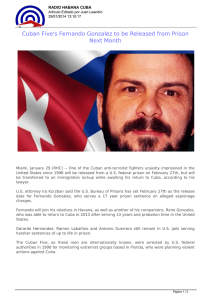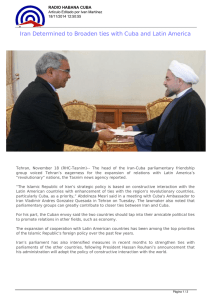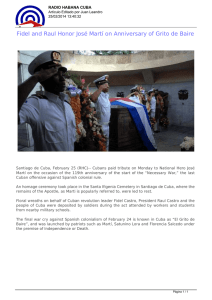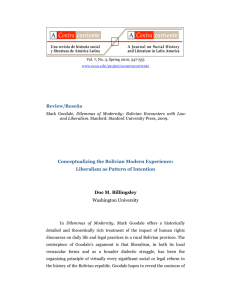Are organs and body parts being harvested in Cuba?
Anuncio
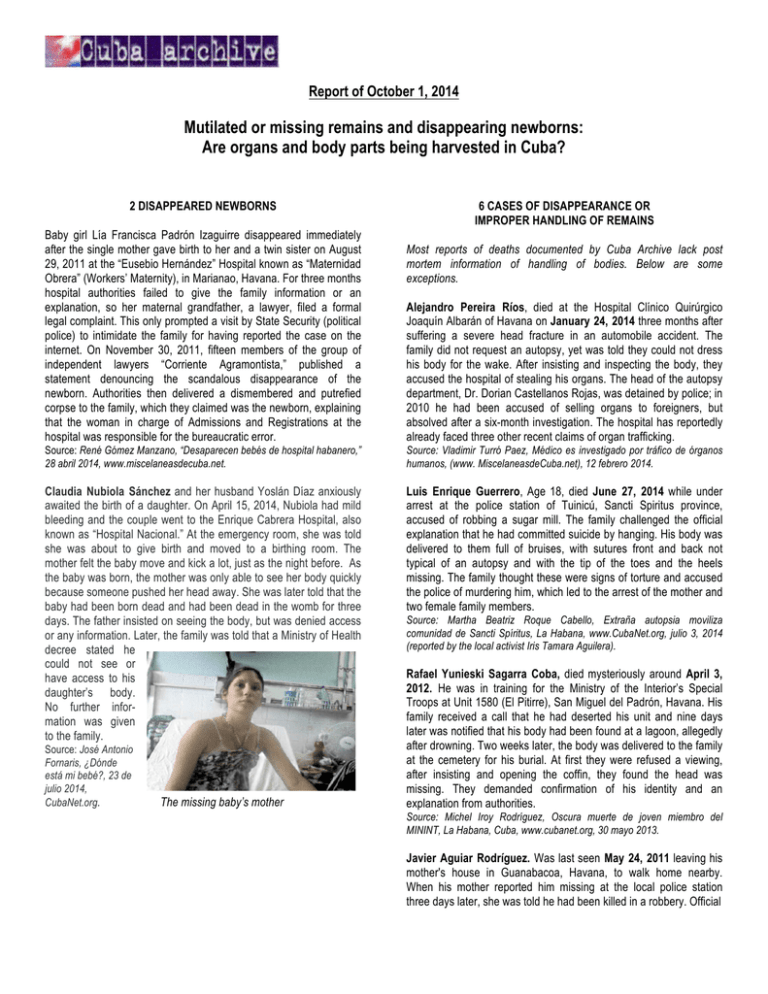
Report of October 1, 2014 Mutilated or missing remains and disappearing newborns: Are organs and body parts being harvested in Cuba? 2 DISAPPEARED NEWBORNS Baby girl Lía Francisca Padrón Izaguirre disappeared immediately after the single mother gave birth to her and a twin sister on August 29, 2011 at the “Eusebio Hernández” Hospital known as “Maternidad Obrera” (Workers’ Maternity), in Marianao, Havana. For three months hospital authorities failed to give the family information or an explanation, so her maternal grandfather, a lawyer, filed a formal legal complaint. This only prompted a visit by State Security (political police) to intimidate the family for having reported the case on the internet. On November 30, 2011, fifteen members of the group of independent lawyers “Corriente Agramontista,” published a statement denouncing the scandalous disappearance of the newborn. Authorities then delivered a dismembered and putrefied corpse to the family, which they claimed was the newborn, explaining that the woman in charge of Admissions and Registrations at the hospital was responsible for the bureaucratic error. 6 CASES OF DISAPPEARANCE OR IMPROPER HANDLING OF REMAINS Most reports of deaths documented by Cuba Archive lack post mortem information of handling of bodies. Below are some exceptions. Alejandro Pereira Ríos, died at the Hospital Clínico Quirúrgico Joaquín Albarán of Havana on January 24, 2014 three months after suffering a severe head fracture in an automobile accident. The family did not request an autopsy, yet was told they could not dress his body for the wake. After insisting and inspecting the body, they accused the hospital of stealing his organs. The head of the autopsy department, Dr. Dorian Castellanos Rojas, was detained by police; in 2010 he had been accused of selling organs to foreigners, but absolved after a six-month investigation. The hospital has reportedly already faced three other recent claims of organ trafficking. Source: René Gómez Manzano, “Desaparecen bebés de hospital habanero,” 28 abril 2014, www.miscelaneasdecuba.net. Source: Vladimir Turró Paez, Médico es investigado por tráfico de órganos humanos, (www. MiscelaneasdeCuba.net), 12 febrero 2014. Claudia Nubiola Sánchez and her husband Yoslán Díaz anxiously awaited the birth of a daughter. On April 15, 2014, Nubiola had mild bleeding and the couple went to the Enrique Cabrera Hospital, also known as “Hospital Nacional.” At the emergency room, she was told she was about to give birth and moved to a birthing room. The mother felt the baby move and kick a lot, just as the night before. As the baby was born, the mother was only able to see her body quickly because someone pushed her head away. She was later told that the baby had been born dead and had been dead in the womb for three days. The father insisted on seeing the body, but was denied access or any information. Later, the family was told that a Ministry of Health decree stated he could not see or have access to his daughter’s body. No further information was given to the family. Luis Enrique Guerrero, Age 18, died June 27, 2014 while under arrest at the police station of Tuinicú, Sancti Spiritus province, accused of robbing a sugar mill. The family challenged the official explanation that he had committed suicide by hanging. His body was delivered to them full of bruises, with sutures front and back not typical of an autopsy and with the tip of the toes and the heels missing. The family thought these were signs of torture and accused the police of murdering him, which led to the arrest of the mother and two female family members. Source: José Antonio Fornaris, ¿Dónde está mi bebé?, 23 de julio 2014, CubaNet.org. The missing baby’s mother Source: Martha Beatriz Roque Cabello, Extraña autopsia moviliza comunidad de Sancti Spíritus, La Habana, www.CubaNet.org, julio 3, 2014 (reported by the local activist Iris Tamara Aguilera). Rafael Yunieski Sagarra Coba, died mysteriously around April 3, 2012. He was in training for the Ministry of the Interior’s Special Troops at Unit 1580 (El Pitirre), San Miguel del Padrón, Havana. His family received a call that he had deserted his unit and nine days later was notified that his body had been found at a lagoon, allegedly after drowning. Two weeks later, the body was delivered to the family at the cemetery for his burial. At first they were refused a viewing, after insisting and opening the coffin, they found the head was missing. They demanded confirmation of his identity and an explanation from authorities. Source: Michel Iroy Rodríguez, Oscura muerte de joven miembro del MININT, La Habana, Cuba, www.cubanet.org, 30 mayo 2013. Javier Aguiar Rodríguez. Was last seen May 24, 2011 leaving his mother's house in Guanabacoa, Havana, to walk home nearby. When his mother reported him missing at the local police station three days later, she was told he had been killed in a robbery. Official explanations were inconsistent and the family was given three different versions of the location of the body. They were told the body had already been buried and subsequently that he had been burned after his assassination. The mother was shown photos of a body with evidence of blows to the legs and feet and the head severed, eyes bulging. (She recognized a tattoo on one thigh.) Several days later, she was taken to a grave to transfer his remains to a cemetery of choice, but insisted it was not his body —among other things, it was missing a cranial deformity caused by forceps at birth. The family was not given a death certificate or a report of where the body had been found. Authorities threatened the mother with prison or death if she did not stop demanding information. Source: Martha Beatriz Roque Cabelllo, Conflictos en la sociedad civil, La Habana, 23 junio 2011. Beatriz Porco Calle, Bolivian citizen, age 22. Died March 29, 2008 at Hospital Faustino Perez or Matanzas. She was a medical student in Havana. Reportedly, she died of a brain hemorrhage from a congenital malformation. Her body was repatriated to Bolivia four days later with all the organs missing, including the brain, lungs, kidneys, liver, ovaries, tongue, eyes, and teeth. Her family accused the Cuban government of trying to cover up organ trafficking and of pressuring them through local government officials to keep silent. Bolivia's Medical Association and several members of Congress called for an official investigation. The Cuban government responded that international and internal rules had been followed and Fidel Castro accused the United States of fabricating lies to create a public relations’ problem for Cuba. summoned. Cuban authorities notified the family he had died in a traffic accident. When his mother traveled to Cuba, she found the body covered in bruises and wounds. When it arrived in Bolivia, eighteen internal organs had been removed including the tongue. Sources: Familia de estudiante muerto en Cuba sentó una denuncia formal, La Prensa (Bolivia), 19/11/2002. Familia de estudiante muerto en Cuba rompe el silencio, Los Tiempos (Bolivia), 15/11/2002. Written testimony of mother, www.aguadadepasajeros. bravepages.com/ 2 CASES FOR WHICH FAMILY WAS DENIED SEEING REMAINS Oscar Chapotín. Died May 31, 2003 at Combinado del Este prison of Havana. He was serving a ten-year sentence when prison guards notified the family that he had been found dead by the railroad tracks near the prison, allegedly after going to buy alcohol and getting hit by a train as he walked around drunk. At his funeral, the casket was sealed and a military guard prevented the family from opening it to see the body. Source: Muere recluso en dudosas circunstancias, La Habana, 6 junio 2003, (www.cubanet.org, 9 junio 2003). Emilio Pérez Valdés, died mysteriously June 30, 2010. Authorities reported that the 15 year-old student had been found dead inside a tank at a cement plant near his school in Mariel, Havana province, hours after he was reported missing. Authorities did not allow the family to see the body or hold a funeral or burial. The family has repeatedly requested an investigation. They have been threatened and harassed by authorities (his stepfather detained once) and in July 2011 they requested political asylum in the United States. Source: Solicitan asilo en EEUU familiares de estudiante fallecido en extrañas circunstancias, CafeFuerte.com, 12 July 2011. Sources: Martin Arostegui, Cuba's harvesting of student's organs riles family, state, The Washington Times, p. A13, May 19, 2008. Polémica por repatriación de una becaria, La Razon, Edición Digital - Abril 23 de 2008. Nota De Prensa, Embajada de Cuba en Bolivia, La Paz, 24 de abril de 2008. Fidel Castro Ruz, Nuestro espíritu de sacrificio y el chantaje del imperio, digital@juventudrebelde.cu, 25 de Abril del 2008. Audio by the family and a Bolivian doctor: www.aguadadepasajeros.bravepages.com. Miguel Ángel Vargas Bastos, Bolivian citizen, age 19, died mysteriously October 21, 2002. He had been a medical student in Havana for two years. Reportedly, he lent his passport for $100 to friends in the Cuban government, who used it to illegally purchase and sell automobiles to foreigners. Three months before his death, he had asked to be sent home to Bolivia and had told authorities and school officials that he had been injected with psychotropic drugs and was being followed and under surveillance. After receiving a death threat, he was last seen on his way to an interrogation center, where he had been Cuba Archive - Truth and Memory www.CubaArchive.org Free Society Project, Inc., July 2014 ©All rights reserved, Redistribution of this material is authorized as long as its source is cited.

